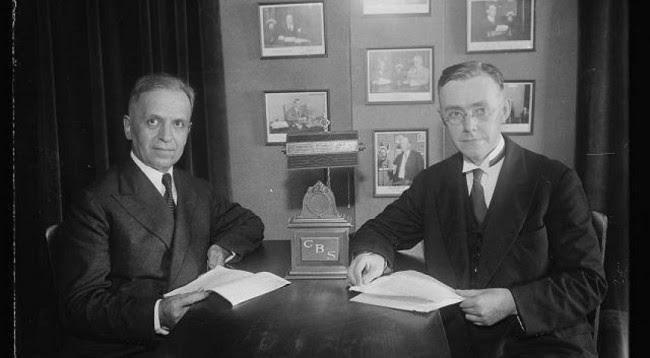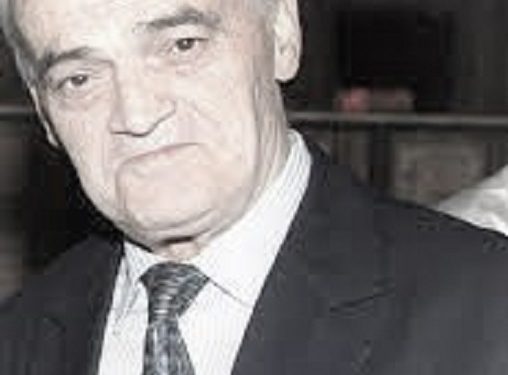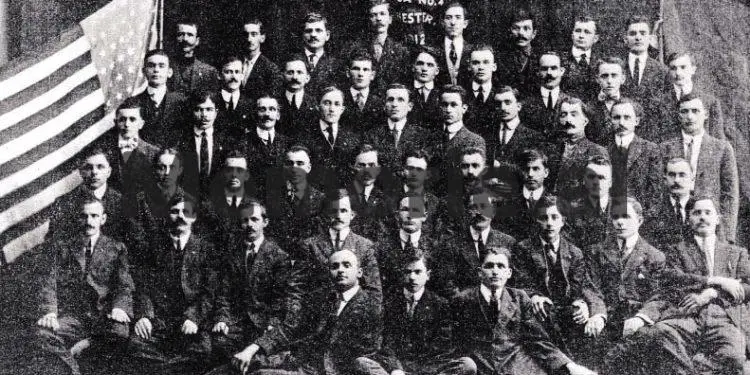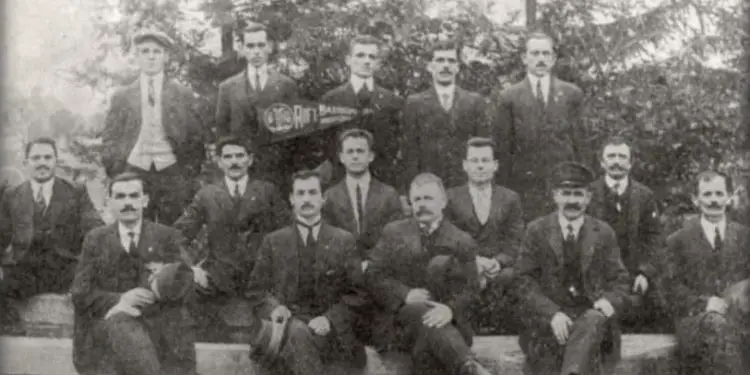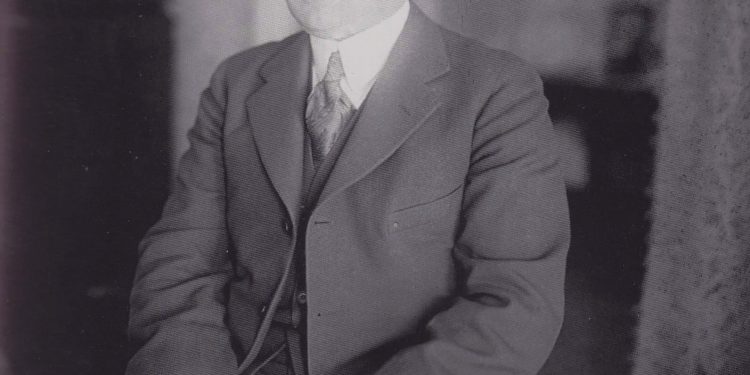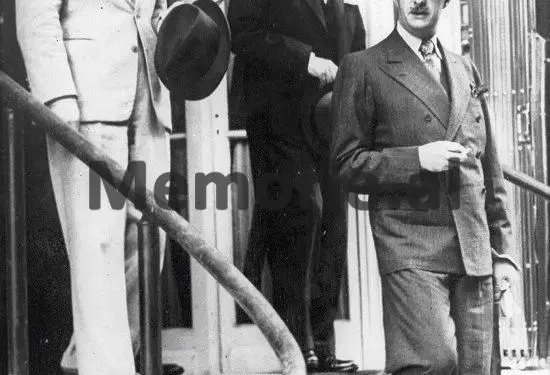By Idriz Lamaj
Part One
Memorie.al / One of the best connoisseurs of the historical activity of “Vatra”, who served in its bosom for 60 years, wrote nearly 40 years ago: “Black Friday, April 7, 1939, found the Vatras badly divided: with two ‘Vatra’ and two ‘Diell’! After Albania was invaded by the Italian army and lost its national freedom, the two ‘Vatra’ immediately united and became once again one ‘Vatra’ and with one ‘Diell’. At that time, there was great hope for the unification of all patriotic Albanians of America around ‘Vatra’, but in vain. The 1940 Assembly elected Faik Konica as president of ‘Vatra’, who, after the occupation of Albania by Italy, was officially notified by high government authorities that his duty as Albanian minister in Washington had been terminated.
For reasons unknown In the clearest of times, ‘Dielli’, the organ of ‘Vatra’, published harsh criticisms against King Zog, who was a refugee in London with the entire Royal Family. This pleased the enemies and disheartened many ‘Vatra’ and good Albanians”. (Refat Gurazezi: “Atdheu”, p. 3, August 1968, New York).
On May 8, 1939, an agreement was reached for the unification of the two ‘vatras’. The second paragraph of the agreement states: “Seeing the danger of Albania, and for the sake of saving our homeland from Italian captivity, this assembly decided to convene a Joint Assembly to unite all ‘vatrans’ and Albanians of America around the Vatra Federation” (‘Dielli’, May 12, 1939).
Various sources of the time prove that this union was very fragile, it was more of a symbolic union than a concrete union to channel a single political strategy against the occupation of Albania. Nevertheless, the attempt of “Vatra” for a rapid political organization is clearly reflected in the newspaper “Dielli”. The last half of 1939 marks for “Vatra” a serious propaganda commitment against the occupation of Albania. Rallies and conferences are held in the branches of “Vatra”.
Faik Konica and Fan Noli, maintain contacts with friends of Albania in Washington, give interviews and write in several American newspapers where they harshly denounce fascist Italy and criticize Western countries for their passive attitude towards the occupation of Albania.
During 1940, “Vatra” developed a slightly more visible activity, held a joint Assembly, appointed a new leadership and elected Konica as chairman. He continued his activities for the liberation of Albania with protests, memoranda and letters sent to various world personalities, primarily the American president and high-ranking officials.
On March 5, Konica wrote a long letter to the American Secretary of State Cordell Hull, in which he also complained about the suspension of diplomatic relations between the American government and the Albanian Legation in Washington. On April 2, 1940, the American Deputy Secretary of State, Mr. Sumner Welles, replied to Konica:
“In fact, the Albanian Legation was closed under circumstances that you know. On June 5, 1939, the Albanian Foreign Minister informed our ambassador in Tirana that the Albanian and Italian governments had signed an agreement, according to which the diplomatic and consular services were merged into one, and that the Albanian Foreign Ministry ceased to operate. As a result of this political development, the American government withdrew its ambassador from Tirana.
A little later, on July 24, after your conversation with the Foreign Minister, Mr. Hull, declared with regret that, under such political circumstances, the American government could not continue to recognize diplomatic immunity for the Albanian Minister in the United States of America. The formalities and preliminary technical arrangements, under which the activity of the Albanian Legation was suspended, have been left entirely in your hands.”
Konica’s engagement in politics was welcomed not only by the ‘patriots’ but also by many exiled patriots and intellectuals. Many friends and well-wishers had written to him, urging him to get involved in politics as soon as possible for the sake of Albania. But in vain, it seems that he had decided, before entering politics, to take the plunge and dip his pen in sulfuric acid, against King Zog, because, ‘he had been held hostage in a hotel for his old debts’.
On February 12, 1940, Konica wrote to Abdurahman Mati in Istanbul:
Dear friend,
I received your letter of the 12th of Kallnor today, – exactly one month after you sent it. I am glad that you are in good health, together with your family.
My friend, the blame for the miseries of Albania lies with Ahmed Bey, who has never cared about anything else, except for his own stinking interests.
You say that Ahmed Bey is my friend. Ahmed Bey loves only one person in the world, – himself. A treacherous, crooked, speechless man, what Ahmed Bey did to me, not even a wild beast could do.
There were some seven thousand dollars (or a thousand napoleons) of old debts collected here, debts of his Legation, debts of his government. He telegraphed me from Istanbul that he would pay them, upon reaching Paris.
In a telephone call from Paris, he assured me that he would send them by telegraph the next day. He did not keep his word. In a few months, he brought me a quarter of the money that was needed. A man who betrays his most loyal friend for a thousand napoleons is not only wicked, but also stupid.
Now I am being forced by the evil to come to terms with my opponents, because I am trapped in the hotel.
Please do not talk to me about Ahmed Bena anymore.
I remain your friend – Faik Konica.
On December 6, 1940, Konica wrote to Dervish Duma in London:
“I am sorry to disappoint you, but I see myself as a person who has moved away from politics. From now on, I have decided to devote myself only to history and literature. But, even if I were inclined towards politics, I certainly would not choose this time for it.” (Faik Konica, Selected Correspondence 1896-1942, London, 2000, p. 94 –).
Konica, although he had publicly declared in Boston that he would no longer engage in politics with Albanians, was forced to change his mind. In 1941, a new rift opened up among the Albanians of America, a rift much more serious than the division of “Vatra” a few years earlier. By the middle of that year, the division became a fait accompli, with the formation of the “Free Albania” organization, which, immediately after its founding, was headed by Kostë Çekrezi, a well-known personality, but a man suspicious of Noli and Konica. During the occupation of Albania, they accused Çekrezi of being a spy for the Greeks and Yugoslavs, although they never presented any convincing documentation for this accusation.
The change in international political circumstances, the expansion of World War II, the anti-Albanian activity of the Greeks and Yugoslavs, the founding of this organization, and Noli and Konica’s hope for support for King Zog from the British, led Konica and Noli to recognize King Zog as the leader of an Albanian government in exile. Their efforts to establish a government were as serious as those of King Zog himself. Noli softened Konica’s harsh stance against the King.
On April 3, 1942, Konica wrote to Dervish Duma:
“Bishop Noli, whom I visited for a few days in Boston, managed to shake off my skepticism. Noli believes that Zog can establish order, and if he is supported by the English, he can still play an important role as a symbol of Albanian freedom.” (Faik Konica, Vepra IV, Tirana 2001, p. 278).
The agreement between Noli and Konica for the formation of the Albanian government in exile is signed in Washington, after talks held at the American Ministry of Foreign Affairs:
“We, the undersigned, were invited by an office of the United States Government in Washington, for an exchange of views on the best way to form an Albanian government in exile. In our talks we insisted on the following points:
1). Only a united Albanian front that includes all Albanian personalities can have any chance of shaking the Albanian people in general and of being useful to the United Nations.
2). King Zog is the most prominent living Albanian personality, and his exclusion would take away the power of the movement that is proposed to be made;
3). No member of the United Front will be forced to give up his political opinions, but will cooperate only until the integrity of the land and the freedom of Albania are assured at the Peace Conference, and then each will regain his freedom to act;
4). A provisional government along the lines proposed by Mr. Cekrezi and his friends would be worse than useless; and would help neither Albania nor the United Nations, but would only advance the aims of those neighbors who have officially declared that they want Albania to be separated;
5). We are ready at any time to cooperate wholeheartedly with the Government of the United States.”
Signed: Faik Konica and F. S. Noli, in Washington on the 19th of the third autumn, 1942. (“Dielli” November 28, 1942).
Noli and Konica’s talks at the American Foreign Ministry and the signing of their agreement for the recognition of King Zog as the leader of the Albanian government in exile, greatly worried Çekrezi and the “Free Albania” organization and excited “Vatrë”. Konica writes to Petro Kolonja:
“Dear Mr. Kolonja,
We thank you for the honor of the two letters, – which I am returning here.
The ‘rumor’ you heard in Southbridge made me laugh. The facts are almost contradictory. The authorities here heard and understood that Çekrezi does not have the importance he wants to give himself. So, with great enthusiasm, they invited Noli, they invited me too, for talks. Noli (between us) had his expenses covered by Uncle Sam. Hopes for the salvation of Albania are increasing. Yours faithfully, Faik Konitza. November 7, 1942”.
On December 10, 1942, the American Secretary of State, Cordell Hull, made this statement:
“The Government of the United States of America is not unfamiliar with the continuous resistance of the Albanian people against the Italian occupying forces. The efforts of the resistance groups operating in Albania against the common enemy are viewed with admiration and are welcomed. The American Government and people look forward to providing military assistance to those brave men to drive the invader out of their homes.
Consistent with its correct political line of not recognizing the occupation of a country by force, the Government of the United States of America has never recognized the annexation of Albania by Italy. In the joint declaration of the American President and the British Prime Minister, issued on August 14, 1941, known as the Atlantic Charter, it is made clear: “We respect the right of every people to choose their form of government and desire the restoration of the sovereign rights of self-government to all peoples whose freedom has been denied by force.”
On December 15, 1942, Faik Konica died. The chairman of “Vatra” closed his eyes, after drafting together with Noli a fair political platform for homeland issues. Although after the occupation of Albania he was a minister without credentials, he enjoyed special respect from his American friends, and from time to time he received from them verbal commitments to protect the territorial integrity of Albania and its inclusion in the anti-fascist war alliance. /Memorie.al
To be continued in the next issue




